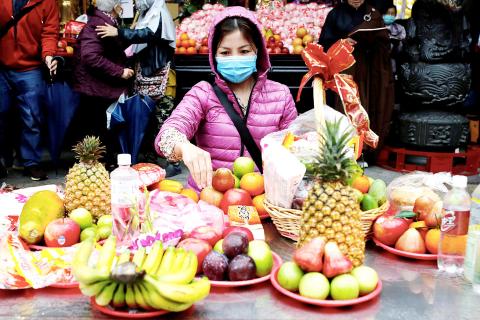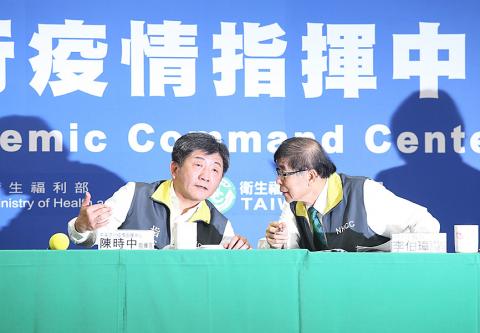The government is preparing a NT$100 billion (US$3.3 billion) stimulus package and monitoring global financial markets amid COVID-19 outbreaks worldwide, President Tsai Ing-wen (蔡英文) said yesterday.
The Legislative Yuan, following its passage of the legal basis for a special budget, is now reviewing the details of the NT$60 billion budget, Tsai said, after convening a high-level national security meeting.
An additional NT$40 billion would be sourced from existing government budgets and other funding, such as the Employment Security Fund and the Tourism Development Fund, and added to the stimulus package, she said.

Photo: Ann Wang, Reuters
The Executive Yuan should inventory all government business and, with the exception of the national defense industry, implement all domestic demand projects with maximum efficacy, Tsai said.
The government should also increase investment in the private sector, particularly Taiwanese businesses returning to invest in the nation, she said.
Tsai instructed the Ministry of Economic Affairs, the Financial Supervisory Committee and the central bank to monitor international markets, especially Wall Street.

Photo: CNA
The government should endeavor to stabilize domestic finances and, to the best of its ability, prevent the public from being overly pressured by the coronavirus, Tsai said.
Earlier yesterday, the Central Epidemic Command Center (CECC) announced a new confirmed case of COVID-19.
The nation’s 49th case is a woman in her 40s living in northern Taiwan, who traveled through the UK, Ireland, Belgium and Turkey from Feb. 21 to Sunday, said Minister of Health and Welfare Chen Shih-chung (陳時中), who heads the center, adding that she exhibited no symptoms on her return.
The woman on Tuesday visited a hospital after experiencing a headache, fatigue and a sore throat, and was yesterday confirmed to have contracted COVID-19, he said.
Based on her activities prior to the onset of symptoms, she likely contracted the disease abroad, the center said.
She did not leave her home after returning from her trip, except to seek medical help, and none of her relatives who live with her have exhibited symptoms, the center said.
A group of 361 Taiwanese who were evacuated from Wuhan, China, late on Tuesday and early on Wednesday had all been tested for the coronavirus as of Wednesday afternoon, the center said.
Among them, 280 had tested negative, it said, while the results for the other 81 were not available when the center held a news conference at 3pm yesterday.
None of the 361 had fevers or other symptoms, it added.
Asked whether the government would adjust control measures on foreign travelers after the WHO on Wednesday declared COVID-19 a pandemic, Chen said that authorities are considering expanding coronavirus testing if needed.
If testing is expanded to foreign travelers entering Taiwan, they might need to pay for the tests themselves, he said.
Asked under what conditions testing would be expanded and who might be tested, Chen cited as an example foreign officials on short visits.
Under such circumstances, the center would allow travelers to be tested, depending on the nation’s testing capacity, he said.
However, because a person’s viral load might be too small to be detected when they are asymptomatic, the center is still assessing the proposal, he added.
Asked whether travel measures would be adjusted for the US, Chen said that “overall, the number of confirmed cases per 1 million people [in the US] is not that high,” adding that the US’ population and size are also relatively large.
The center would probably next implement measures by state and region, he said.

CHAOS: Iranians took to the streets playing celebratory music after reports of Khamenei’s death on Saturday, while mourners also gathered in Tehran yesterday Iranian Supreme Leader Ayatollah Ali Khamenei was killed in a major attack on Iran launched by Israel and the US, throwing the future of the Islamic republic into doubt and raising the risk of regional instability. Iranian state television and the state-run IRNA news agency announced the 86-year-old’s death early yesterday. US President Donald Trump said it gave Iranians their “greatest chance” to “take back” their country. The announcements came after a joint US and Israeli aerial bombardment that targeted Iranian military and governmental sites. Trump said the “heavy and pinpoint bombing” would continue through the week or as long

TRUST: The KMT said it respected the US’ timing and considerations, and hoped it would continue to honor its commitments to helping Taiwan bolster its defenses and deterrence US President Donald Trump is delaying a multibillion-dollar arms sale to Taiwan to ensure his visit to Beijing is successful, a New York Times report said. The weapons sales package has stalled in the US Department of State, the report said, citing US officials it did not identify. The White House has told agencies not to push forward ahead of Trump’s meeting with Chinese President Xi Jinping (習近平), it said. The two last month held a phone call to discuss trade and geopolitical flashpoints ahead of the summit. Xi raised the Taiwan issue and urged the US to handle arms sales to

BIG SPENDERS: Foreign investors bought the most Taiwan equities since 2005, signaling confidence that an AI boom would continue to benefit chipmakers Taiwan Semiconductor Manufacturing Co’s (TSMC, 台積電) market capitalization swelled to US$2 trillion for the first time following a 4.25 percent rally in its American depositary receipts (ADR) overnight, putting the world’s biggest contract chipmaker sixth on the list of the world’s biggest companies by market capitalization, just behind Amazon.com Inc. The site CompaniesMarketcap.com ranked TSMC ahead of Saudi Aramco and Meta Platforms Inc. The Taiwanese company’s ADRs on Tuesday surged to US$385.75 on the New York Stock Exchange, as strong demand for artificial intelligence (AI) applications led to chip supply constraints and boost revenue growth to record-breaking levels. Each TSMC ADR represents

Pro-democracy media tycoon Jimmy Lai’s (黎智英) fraud conviction and prison sentence were yesterday overturned by a Hong Kong court, in a surprise legal decision that comes soon after Lai was jailed for 20 years on a separate national security charge. Judges Jeremy Poon (潘兆初), Anthea Pang (彭寶琴) and Derek Pang (彭偉昌) said in the judgement that they allowed the appeal from Lai, and another defendant in the case, to proceed, as a lower court judge had “erred.” “The Court of Appeal gave them leave to appeal against their conviction, allowed their appeals, quashed the convictions and set aside the sentences,” the judges